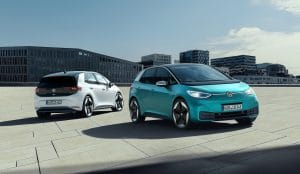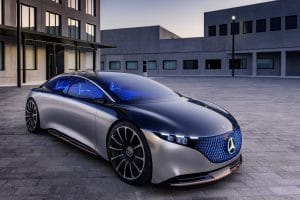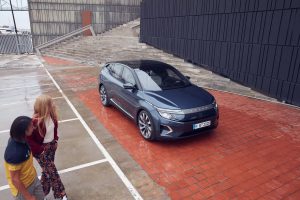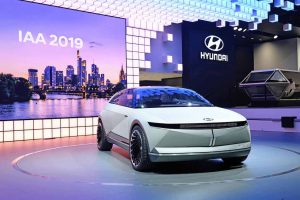With a 48-inch videoscreen running from door to door, the Byton M-Byte might seem like little more than a fantasy in chrome, but eight months after a concept version of the battery-electric vehicle made its debut at the Consumer Electronics Show, it is set to soon go into production.
The Chinese start-up is just one of many manufacturers displaying their wares this week at the Frankfurt Motor Show, the biggest European automotive event of the year. There are plenty of traditional, gas and diesel-powered vehicles on display, like the little Hyundai i10 and BMW’s ultimate performance machine, the M8. But just about everywhere you turn at the Frankfurt Messe, the city’s big convention complex, there are battery cars, whether hybrids, plug-ins or pure electric.
Byton is one of the start-ups displaying at Frankfurt and hoping to crack into the established automotive order. But traditional automakers like Audi, BMW, Hyundai, Mercedes-Benz and Volkswagen are also plugging in and showing off their own “electrified” offerings. Some are still in concept form, but others are getting ready to roll into showrooms around the world.
(Click Here for complete coverage of the 2019 Frankfurt Motor Show.)

The new ID.3 will come with three battery packs eventually with a range from 226 miles to 342 miles.
One of the most eagerly awaited Frankfurt debuts was the production version of the Volkswagen ID.3. The company had already shown a concept model earlier this year and has been taking orders for months, VW claiming it has sold out the limited-run First Edition ID.3, priced at 40,000 euros, or around $44,100. It will follow with several other versions, including a base battery-car which, for less than 30,000 euros will get around 200 miles per charge. Another will extend that to 342 miles.
For now, VW isn’t planning to bring what it calls an “electric car for the masses” to the U.S. market, but the underlying MEB “architecture” will serve as the platform for dozens of other all-electric models parent Volkswagen Group will sell through its various brands, including two that will go into production at VW’s Chattanooga, Tennessee assembly plant in just a couple years, starting with a battery-SUV.
Those various Volkswagen brands have staked out an extensive presence in Frankfurt. Audi not only is showing off its first long-range battery-car, the e-tron SUV already on sale in the U.S., but also revealing the AI:Trail Quattro. It’s a concept off-roader using four separate motors, one for each wheel, to enhance its grip, whatever trail it tackles. While the extreme exterior design suggests it’s purely a show car, Audi has been delivering some surprises of late. The audacious e-tron GT sports car that debuted at the Los Angeles Auto Show last November will return in production form in just a couple years.
Lamborghini, Volkswagen’s most extreme performance brand, is underscoring the way battery power is transforming every aspect of automotive design and engineering. While supercars traditionally rely on large-displacement engines, some are going all-electric – like the Pininfarina Battista that debuted earlier this year. Others are opting to use electric motors to assist their gas engines.

The most powerful Lamborghini ever is also its first hybrid, the Sian. It gets a boost from a 48-volt system powered by an ultracapacitor.
(VW gets a new logo – and a new “sound logo” to usher in its new EVs. Click Here for more.)
The new Lamborghini Sian pairs a 6.5-liter V-12 with a 48-volt “mild” hybrid system to create its most powerful model ever, at a combined 808 horsepower. While Lambo isn’t the first supercar company to use hybrid power, the Sian delivers one breakthrough: instead of using a lithium-ion battery pack, it opts for a lightweight ultracapacitor.
Electric motors offer the advantage of offering instant, off-the-line torque, one of the reason battery power is being embraced both by performance brands and motors sports. The Indy Series is about to shift to hybrid technology. And, among an assortment of battery-based models Hyundai is debuting in Frankfurt, the Veloster N ETCR, its first electric race car.
Hyundai is rolling out an array of hybrids, plug-ins and all-electric models, as well as several zero-emissions hydrogen cars. It also has formed a partnership with Croatian start-up Rimac. That battery-supercar company has formed a series of alliances of its own and, just last week, Porsche increased its stake in Rimac to 15%, a move that could see it develop an assortment of new, all-electric supercars. Porsche’s first long-range model, the Taycan, made its formal media debut just last week and this week is on display for the public for the first time.
Daimler AG is another company making big plans for battery power. And among the many new models it is debuting in Frankfurt, it’s the Vision EQS that’s generating most of the attention. EQ is the new Mercedes sub-brand focusing on all-electric models, such as the compact EQC crossover coming to the U.S. in a year. As the name suggests, the Vision EQS offers a strong hint of what an all-electric alternative to the flagship Mercedes S-Class would look like. And the betting is that a production model is already in the works.

The Mercedes-Benz Vision EQS provides an outlook on a concept for a fully-electric vehicle in the luxury class.
Automakers around the world are facing heavy pressure to electrify as key markets like the U.S., China and the European Union enact ever stricter emissions and fuel economy regulations. Add in incentives and plug-based vehicles in China have defied that market’s ongoing slump. In Norway, electric vehicles, such as the Tesla Model 3, now account for over half of new car sales.
Over the coming years, the majority of new products are expected to offer some form of battery drive, at least as an option. The new Land Rover Defender debuting in Frankfurt is one example. Among the two powertrains coming to the U.S., the P400 package is a mild hybrid, pairing a six-cylinder gas engine with a small motor to improve performance, boost mileage and reduce emissions.
This year’s Frankfurt Motor Show is one of the smallest in years, a number of traditional entrants, like Ferrari, Fiat Chrysler, Nissan, Toyota and Volvo sitting it out. But there are a number of new players on display, including Byton. The automaker faced plenty of skeptics when it showed a concept version of the M-Byte at CES last January. But it has been gaining credibility, in part with the help of an investment by First Automobile Works, one of China’s largest homegrown manufacturers.
Byton now plans to launch production of the M-Byte at a new, $1.5 billion factory in Nanjing next year. Initial deliveries will go to China, but it expects to start U.S. sales in 2021, adding yet another option in a market segment expected to have dozens of new products hit showrooms over the next two to three years.



